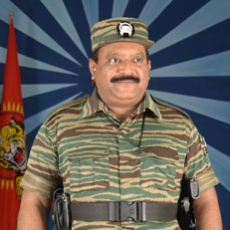OBITUARY: Velupillai Prabhakaran, Tamil guerilla leader
 Colombo - Velupillai Prabhakaran, the fearsome leader and founder of the Tamil Tiger rebels, accused of numerous murders and acts of terrorism, made his place in history by altering the political landscape of the island nation of Sri Lanka.
Colombo - Velupillai Prabhakaran, the fearsome leader and founder of the Tamil Tiger rebels, accused of numerous murders and acts of terrorism, made his place in history by altering the political landscape of the island nation of Sri Lanka.
The elusive rebel leader was reported by the country's state media to have been killed Monday by the Sri Lankan army. Rebel sources had yet to confirm the death of their leader Monday night, but a formal government announcement of Prabhakaran's death while trying to escape the army's final push on a rebel enclave was expected on Tuesday.
Prabhakaran evoked mixed feelings among many Sri Lankans. His followers saw him as a freedom fighter, but to his adversaries he was a brutal megalomaniac using child soldiers to pursue his goals.
Born in a coastal village of northern Sri Lanka on November 26, 1954, Prabhakaran in 1972 formed a group known as the Tamil New Tigers, but three years later became a founding member of the Liberation Tigers of Tamil Eelam (LTTE), which he led the rest of his life with an iron fist.
Prabhakaran had a reputation of being a fearless and ruthless guerrilla leader who was fighting for an independent homeland for the minority Tamils in predominantly Sinhalese Sri Lanka.
To instill discipline and ensure loyalty, he got his fighters to wear a cyanide capsule around their neck and were told to swallow it when they faced the threat of being arrested. Many of them did.
Prabharakan was instrumental in organizing a suicide squad known as the Black Tigers who were willing to carry out any suicide mission. Their reward was a last meal with the elusive leader and a chance to pose with him for a final photograph before the mission.
He also expanded the LTTE from pure guerilla movement to include a navy and air force as well as army and police.
For most of the past three decades, his organization showed no sign of being defeated militarily by the Sri Lankan army or even by the Indian peacekeeping force that made an attempt to wipe out the movement between 1987-1990.
Though the movement suffered setbacks, it always bounced back, with surprise attacks or assassinations of high-profile targets.
The Tamil Tiger leader participated in the country's devastation by civil war and was responsible for dozens of assassinations. The victims include former Sri Lankan president Ranasinghe Premadasa in 1993 and former opposition presidential candidate Gamini Dissanayaka in 1991.
The LTTE nearly succeeded in assassinating former president Chandrika Kumaratunga in 1999. Prabharakan, who was wanted by Interpol and other organizations for terrorism, murder and organized crime, was also held responsible for the assassination of former Indian premier Rajiv Gandhi in 1991.
However, the turning point for Prabhakaran was the election of Mahinda Rajapaksa as president in November 2005. Prabhakharan involuntarily contributed to the election of his arch-nemesis by forcing some 200,000 minority Tamils to boycott the presidential poll, a major tactical blunder.
The boycott was widely believed to have prevented opposition leader Ranil Wickremesinghe, the architect of a Norwegian-backed peace process with the LTTE, from becoming president.
Three weeks after Rajapaksa's election, Prabhakaran went on the offensive, attacking the security forces in the north and east, as well as civilian targets.
The LTTE chief eventually took on army commander Lieutenant General Sarath Fonseka, by sending a woman suicide bomber to explode herself close to his vehicle.
She failed in the mission, but seriously injured the commander, leading Rajapaksa to direct a series of airstrikes on a rebel stronghold district in the north-east of the country.
Four months later, the president ordered a full-scale offensive, which led to thousands of civilian casualties and the displacement of many more.
Prabhakaran first lost control of the Eastern Province within a one year, and then gradually lost the vast area of control in the Northern Province. He lost town after town, but until the LTTE lost its administrative headquarters in Kilinochchi at end of last year, the rebels believed they could bounce back.
When some of Prabakaran's own hideouts were captured by the army, it became clear that the end of his rein of terror was imminent. Prabhakaran was drawn into peace talks on four to five occasions, but appeared to have no confidence in negotiations and kept building his military strength. His loyalists say he never trusted the country's political leadership.
Prabhkaran was married to Mathivathani Erambu. The couple had one daughter named Duwaraka, a son named Charles Anthony and another son named Balachandran. Charles Anthony, fighting alongside his father, was also reported killed on Monday, but the rest of the family has been overseas in recent years.(Dpa)